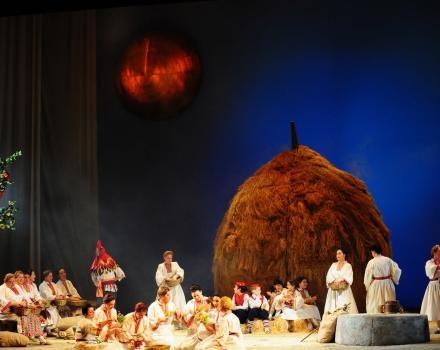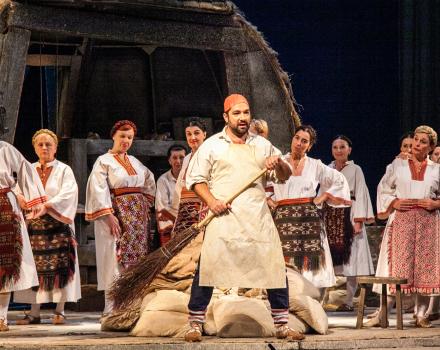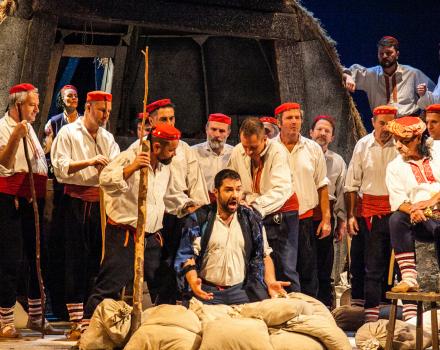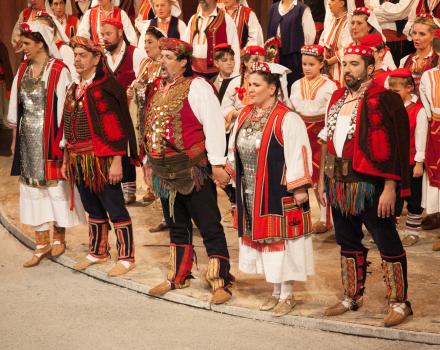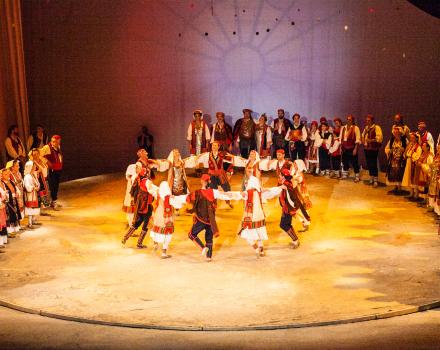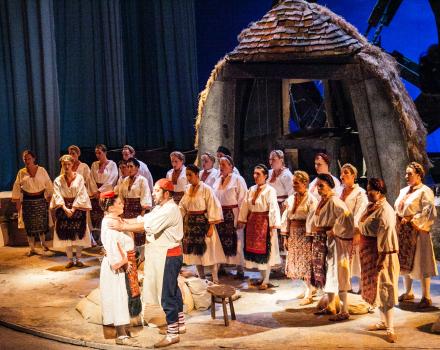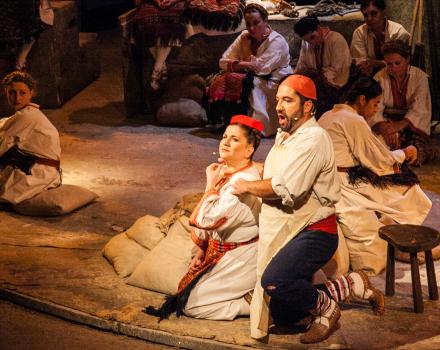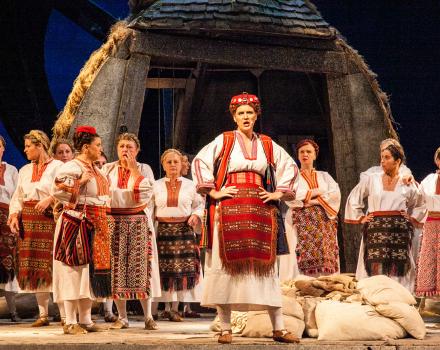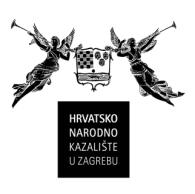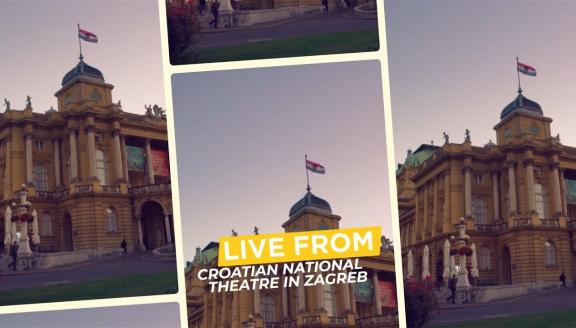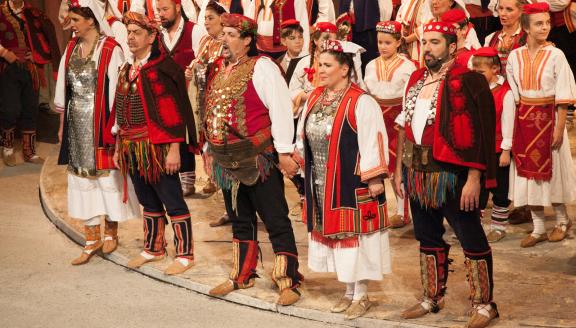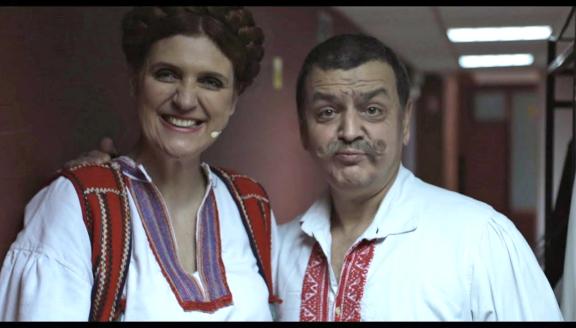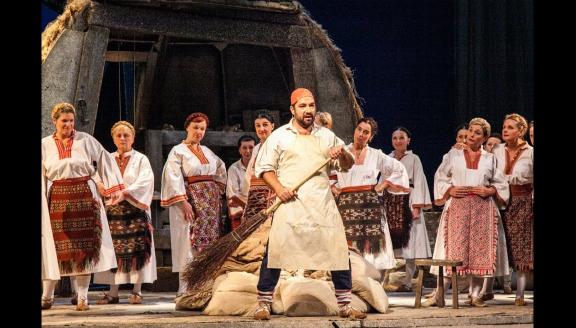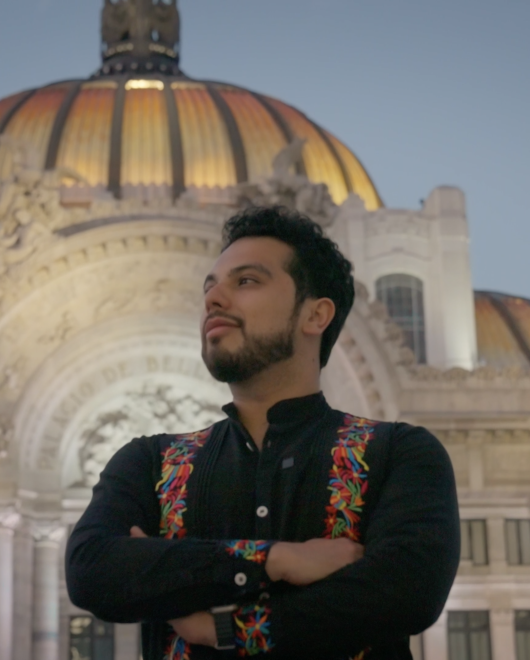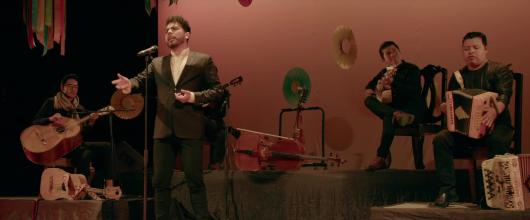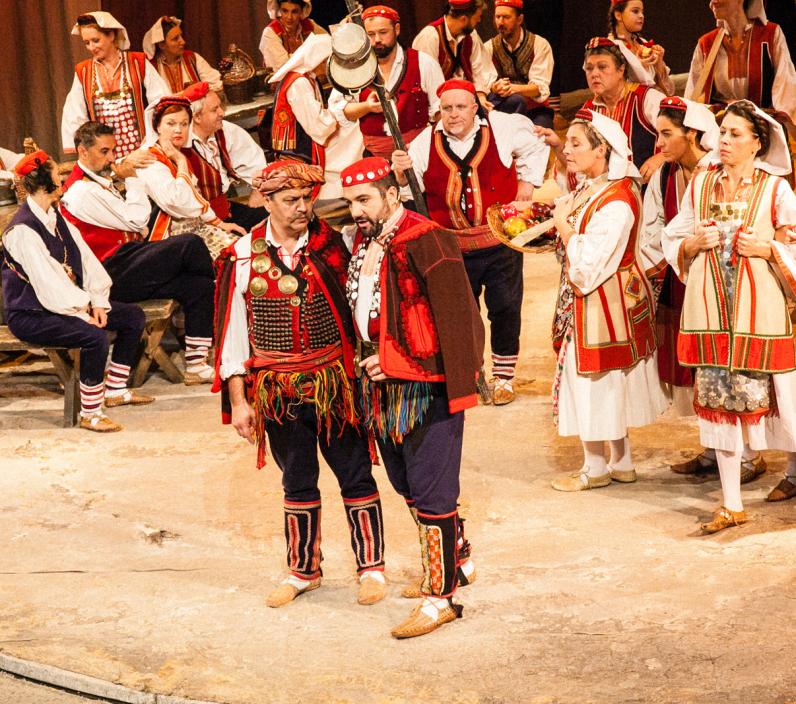

To find a wife who truly loves him, a young trickster disguises himself as a pauper. But getting her parents' blessing will take every trick in the book.
Part of the Croatian National Theatre’s repertoire since its premiere in 1935, Jakov Gotovac’s comic opera is an ode to a rural way of life. It culminates in a frenzied tempo with a vigorous ballet – a celebration of Dalmatian music and dance.
Cast
Đula | Valentina Fijačko Kobić |
|---|---|
Mića, known as Ero the Joker | Stjepan Franetović |
Doma, Đula's step-mother | Dubravka Šeparović Mušović |
Marko, Đula's father | Siniša Štork |
Sima, a miller | Ljubomir Puškarić |
Čobanče, a sheperd | Ana Zebić Kostel |
Momče, a young man | Neven Mrzlečki |
Chorus | Choir of the Croatian National Theatre |
Orchestra | Orchestra of the Croatian National Theatre |
| ... | |
Music | Jakov Gotovac |
|---|---|
Conductor | Josip Šego |
Director | Krešimir Dolenčić |
Sets | Dalibor Laginja, Ante Serdar |
Costumes | Inga Kostinčer (renewed by Dženisa Pecotić) |
Text | Milan Begović |
Chorus Master | Luka Vukšić |
| ... | |
Video
The story
Act I
On the floor of a barn, Đula husks corn with her friends. She daydreams about a stranger who has recently been sending her gifts. Suddenly, out of the hay-stack drops Mića, a merry young lad dressed as a pauper. He introduced himself as Ero the Joker, and he tells Đula that her late mother is sending her a sweetheart. Đula’s stepmother Doma breaks up the gathering. She orders Đula to do her chores and chastises Mića when he offers to help. Mića warns Doma that her stew is about to burn, and she leaves in an angry huff. Alone with Đula, Mića admits that it was he who sent her the gifts. Đula falls in love with him, and they agree to meet near the village mill just before her father Marko arrives home.
Mića asks Marko for lodgings, but Marko sends him off because he is in rags. Doma has heard rumours that a mysterious person from another world is in town. She wants to know how her late first husband Matija is doing. Mića tells Doma that in that other world everything has to be paid for just like here on Earth, and that her late husband is broke. Upset, Doma gathers Marko’s entire savings and gives them to Mića. He leaves happily, promising to pass the money onto Matija. When Marko finds Doma in tears, she tells him the whole story. He alerts his men and the entire village starts to chase after the thief.
Act II
At the mill, Sima the miller sings merrily while the village women arrive with their grain. The last one to arrive is Doma, who demands that her grain be ground first. In the ensuing row Doma insults the other women and Sima snaps at Đula. The step-daughter grieves for her late mother and then leaves the mill but forgets to take the horse’s feedbag.
While cleaning the mill, Sima hears a clatter of hooves approaching from afar. It is Marko in pursuit of the thief, but the miller mistakenly believes that Marko is coming after him because of his fight with Doma and Đula. When hides in fear, Mića sneaks into the mill and disguising himself as Sima. Marko arrives at the mill and asks which way the thief went. Pretending to help, Mića sends Marko in the direction of the miller, promising to guard his horse while he searches for the thief.
Đula returns for the forgotten feedbag. She is surprised to find Mića there and is angry at him for leaving her without saying goodbye. Mića’s sincere words soften her and convince her of his love and honest intentions, so Đula agrees to elope with him. Marko and his men catch Sima and accuse him of colluding with the thief. Suddenly, they see Mića hurrying into the skies on Marko’s horse with Đula. Marko realises that he has also been swindled and makes peace with Sima.
Act III
At a village fair Doma decides to leave Marko after they have a fight. Sima tells Marko that he has seen Đula in another village, where she lives on a large estate with Ero the Joker, whose real name is Mića. The couple arrive at the fair in elegant dress, and the village folk welcome them merrily. Marko and Doma are still angry at Mića, so he tells them his story: he is a wealthy landlord who was instructed by his mother to appear before his sweetheart as a poor man. Now that he has Đula forever, he is returning Doma’s money and Marko’s horse. Everyone reconciles and joins in with the singing and dancing.
Insights
5 things to know about Ero the Joker
1° Law and Music
The Croatian composer Jakov Gotovac was born in Split on 11th October 1895, where he completed his high school education and first attempted to compose. In 1913, he began taking lessons in harmony from the composer Antun Dobronić and also enrolled at the University of Law in Zagreb. Gotovac returned home during the First World War, where he took classes in instrumentation and conducting from the distinguished Czech conductor and choirmaster Cyril Metoděj Hrazdira. After winning a prize for his first serious composition, Two Scherzos, Op. 1, he was invited to Vienna by a music publishing house. He stayed in the city for a year, enthusiastically attending lectures by the Austrian composer, teacher and critic Joseph Marx at the Music Academy. It was there that he decided to abandon his law studies and to dedicate himself to music.
2° A Lifelong Commitment
In the early 1920s, Gotovac moved to Šibenik, where he was active in the city’s Philharmonic Society. There he met primadonna Maja Strozzi-Pečić, who invited the composer to Zagreb. Gotovac joined the staff at the Opera of the Croatian National Theatre in Zagreb as a music répétiteur. He would remain at the Theatre until his retirement 35 years later, working his way up the ranks to become its Director of Opera. During that time he composed several operas, of which Ero the Joker was the most popular. As with several of his other works, it is inspired by Croatian folklore and traditional music, and is representative of the late national romanticism popular throughout Europe at the time. Ero the Joker has since been staged in eighty theatres around the world and translated into nine languages, and is by far the most performed of Gotavac’s operas. The composer died in 1982 having seen all his operas staged except his opera-oratorio Petar Svačić about the last native king of Croatia.
3° Rise and Fall
Ero the Joker’s librettist is Milan Begović, a Croatian writer, dramatist, critic and translator who was born in 1876 in the small village of Vrlika. Today a town of 2 100 people in the county of Split-Dalmatia, his birthplace was the inspiration for the setting of the opera. From 1909, Begović worked as a dramaturg at the Deutsches Schauspielhaus in Hamburg before becoming a dramaturg and stage director at the Neue Wiener Bühne in Vienna. After the First World War, he returned to Croatia to write and teach in Zagreb. His 1926 drama Adventurer Before the Door was a big success, and Begović was soon made Director of Drama at the Croatian National Theatre in Zagreb. Alongside that play and his libretto for Gorovac’s opera, he is best remembered for his sentimental comedy American Yacht in the Port of Split. After the Second World War, Begović was judged to have collaborated with the war-time Independent State of Croatia. He died in Zagreb in 1948 and, due to his falling out with the regime, his death was neither announced nor given special honours.
4° Sprung from Dalmatia
Today a town of 828 people in the Croatian county of Split-Dalmatia, Vrlika was a village in the Kingdom on Dalmatia, a crown land of the Austrian Empire, when Begović was born there in 1876. The librettist used it as the setting for Ero the Joker, and its traditions, costumes, music and dance all made their way into the opera. Vrlika has since honoured its favourite son with a statue in the town’s Česma Park, where water rises from a spring before flowing into the River Cetina. It is a central gathering place for the townsfolk, and is the location of the village fair in Act III of Ero the Joker. It’s also the stage for an annual open air performance of the opera that takes place as part of the Split Summer Festival. But Vrlika’s traditions do not come alive for just one night of the year; the town is home to KUU ‘Milan Begović’, a folklore ensemble whose members dedicate themselves to preserving and celebrating the very culture with which Gotovac and his librettist were so enamoured.
5° International Acclaim
The German conductor Wilhelm Furtwängler once said that ‘Today, no courage is necessary for accumulating the most senseless – also called the boldest – chords, but particularly great courage is necessary to compose even one pure chord or one simple phrase.’ Wherever and whenever Ero the Joker has travelled, the opera and its creator have received glowing reviews from critics of all persuasion. Writing in the Saar-Volksstimme newspaper in 1956, Robert Hahn identified Gotovac as a composer with such courage as described by Furtwängler: ‘Gotovac remained faithful to the language of his people. The folk melody is the alpha and omega of his expression that this experienced and well-educated musician adorns into a glittering, modern orchestral attire. It is timeless language – composition in accordance with the time.’
Gallery

